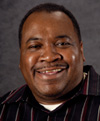Dispatch from Philadelphia: Why I tell my story
11.09.07
By David Shephard, Exoneree; President, Northeast Council on the Wrongfully Convicted

Twenty-three years ago I was convicted in New Jersey of a horrible rape I didn’t commit, simply because I worked at the Newark airport, near where the victim’s stolen car was found. I was in prison for almost a decade before DNA testing proved my innocence and led to my release. I was 32 years old and I walked into a changed world. I had to rebuild old relationships. I had to look for a job and explain what I had been doing during my twenties. It wasn’t easy.
Now I’ve been out for 12 years and I’m proud to say I live a happy and productive life. I have a beautiful family, I work hard at my county’s Department of Citizen Services and, whenever I can, I tell anyone who will listen about my case and the causes of wrongful conviction. This morning I’m writing from Philadelphia, where I joined Innocence Project Executive Director Maddy deLone on a panel at the
29th annual conference of the National Association of Women Judges
. I’m excited to be here, because telling my story is one of the most important contributions I can make to the innocence movement.
I tell my story because people in this country still have too much faith in our broken criminal justice system. They watch TV and they think the courts are just like they seem in “Law & Order.” I can tell you from experience that they aren’t. I’ve spoken to thousands of people over the years, and many of them already knew about the problem of wrongful convictions before they met me. I’ve learned, however, that they don’t really feel the depths of the issue until they meet an exoneree. It doesn’t have to be me – it can be anyone who has been through the minefield of wrongful conviction. I was speaking in southern New Jersey last week and during my speech I saw faces changing from skeptical to intrigued to devoted. Events around the world are often posted on this blog. If you read about an exoneree’s speech in your town, go hear it. You won’t regret it.
This morning, I spoke to an audience of judges from across the country, all of whom have firsthand knowledge of how our justice system works. But even among this group of insiders, I was the first exoneree many have met in person. And the same holds true for anyone I meet: you can read about this problem all you want, but until it has a human face, it isn’t real.
During this morning’s panel, I told the audience that every inmate with a valid claim of innocence should have access to DNA testing. Why should we have this all-powerful science and not use it? It’s a tragedy that
eight states
still don’t have laws allowing inmates to apply for DNA testing when it can prove innocence. Even in many of the 42 states with DNA access laws, defendants are still often denied access due to technicalities. If the prosecutor in my case hadn’t agreed to test the evidence, I might not be writing this today. But this issue is bigger than me, it’s bigger than the 208 DNA exonerees. It’s a national problem and we need a national standard for DNA testing access. I told my story this morning, and I will continue to speak out, because there are more innocent people behind bars and we shouldn’t rest until they are free.
David Shephard was exonerated in New Jersey in 1995. He lives with his family in Newark, New Jersey, and serves as the Founding President of the Northeast Council of the Wrongfully Convicted.
Learn more about his case here
.

Leave a Reply
Thank you for visiting us. You can learn more about how we consider cases here. Please avoid sharing any personal information in the comments below and join us in making this a hate-speech free and safe space for everyone.